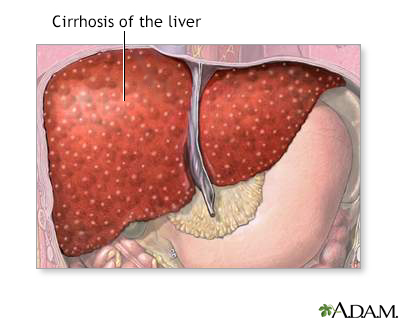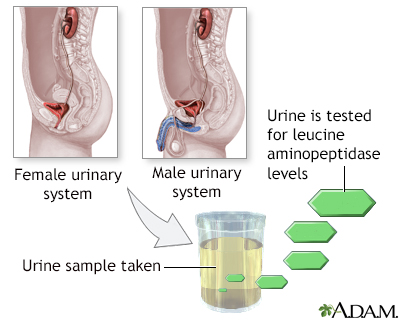Leucine aminopeptidase - urine
Leucine aminopeptidase is a type of protein called an enzyme. It is normally found in liver cells and cells of the small intestine. This test is used to measure how much of this protein appears in your urine.
Your blood can also be checked for this protein.
Images


I Would Like to Learn About:
How the Test is Performed
A 24-hour urine sample is needed.
- On day 1, urinate into the toilet when you get up in the morning.
- Afterward, collect all urine in a special container for the next 24 hours.
- On day 2, urinate into the container when you get up in the morning.
- Cap the container. Keep it in the refrigerator or a cool place during the collection period.
Label the container with your name, the date, the time of completion, and return it as instructed.
For an infant, thoroughly wash the area where urine exits the body.
- Open a urine collection bag (a plastic bag with an adhesive paper on one end).
- For males, place the entire penis in the bag and attach the adhesive to the skin.
- For females, place the bag over the labia.
- Diaper as usual over the secured bag.
This procedure may take more than one try. An active infant can move the bag, so that the urine leaks into the diaper.
Check the infant often and change the bag after the infant has urinated into it.
Drain the urine from the bag into the container given to you by your health care provider. Deliver the sample to the laboratory or your provider as soon as possible.
Your provider will tell you, if needed, to stop taking drugs that may interfere with the test.
How to Prepare for the Test
Your provider may tell you to stop taking any medicines that could affect the test. Drugs that can affect the results of this test include estrogen and progesterone. Never stop taking any medicine without first talking to your provider.
How the Test will Feel
The test involves only normal urination. There is no discomfort.
Why the Test is Performed
You may need this test to see if there is liver damage. It may also be done to check for certain tumors.
This test is only rarely done. Other tests such as gamma glutamyl transpeptidase are more accurate and readily available.
Normal Results
Normal values range from 2 to 18 units per 24 hours.
Normal value ranges may vary slightly among different laboratories. Talk to your provider about the meaning of your specific test results.
The examples above show the common measurements for results of these tests. Some laboratories use different measurements or may test different specimens.
What Abnormal Results Mean
Increased levels of leucine aminopeptidase can be seen in several conditions:
- Cholestasis
- Cirrhosis
- Hepatitis
- Liver cancer
- Liver ischemia (reduced blood flow to the liver)
- Liver necrosis (death of liver tissue)
- Liver tumor
- Pregnancy (late stage)
Risks
There is no risk to a urine collection.
Related Information
Leucine aminopeptidase blood testEnzyme
Protein in diet
Amino acids
Cholestasis
Cirrhosis
Hepatic
Necrosis
Liver cancer - hepatocellular carcinoma
Hepatitis
References
Daniels L, Khalili M, Goldstein E, Bluth MH, Bowne WB, Pincus MR. Evaluation of liver function. In: McPherson RA, Pincus MR, eds. Henry's Clinical Diagnosis and Management by Laboratory Methods. 24th ed. Philadelphia, PA: Elsevier; 2022:chap 22.
Korenblat KM, Berk PD. Approach to the patient with jaundice or abnormal liver tests. In: Goldman L, Schafer AI, eds. Goldman-Cecil Medicine. 26th ed. Philadelphia, PA: Elsevier; 2020:chap 138.
BACK TO TOPReview Date: 2/1/2023
Reviewed By: Michael M. Phillips, MD, Emeritus Professor of Medicine, The George Washington University School of Medicine, Washington, DC. Also reviewed by David C. Dugdale, MD, Medical Director, Brenda Conaway, Editorial Director, and the A.D.A.M. Editorial team.

Health Content Provider
06/01/2025
|
A.D.A.M., Inc. is accredited by URAC, for Health Content Provider (www.urac.org). URAC's accreditation program is an independent audit to verify that A.D.A.M. follows rigorous standards of quality and accountability. A.D.A.M. is among the first to achieve this important distinction for online health information and services. Learn more about A.D.A.M.'s editorial policy, editorial process and privacy policy. A.D.A.M. is also a founding member of Hi-Ethics. This site complied with the HONcode standard for trustworthy health information from 1995 to 2022, after which HON (Health On the Net, a not-for-profit organization that promoted transparent and reliable health information online) was discontinued. |
The information provided herein should not be used during any medical emergency or for the diagnosis or treatment of any medical condition. A licensed medical professional should be consulted for diagnosis and treatment of any and all medical conditions. Links to other sites are provided for information only -- they do not constitute endorsements of those other sites. © 1997- 2024 A.D.A.M., a business unit of Ebix, Inc. Any duplication or distribution of the information contained herein is strictly prohibited.
